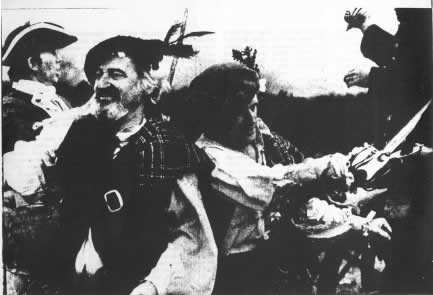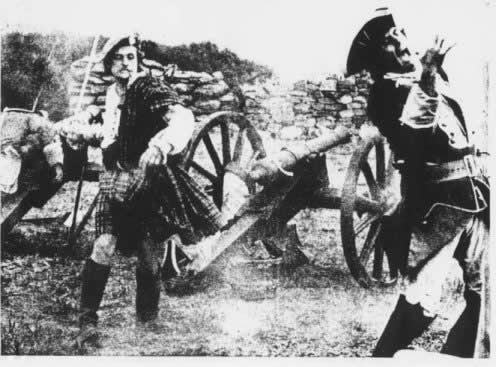 THE
ALL-ACTION LOWLANDER COMES HOME AND SLIPS INTO A KILT
THE
ALL-ACTION LOWLANDER COMES HOME AND SLIPS INTO A KILT  THE
ALL-ACTION LOWLANDER COMES HOME AND SLIPS INTO A KILT
THE
ALL-ACTION LOWLANDER COMES HOME AND SLIPS INTO A KILT
Culloden was the Highlander’s holocaust. Here, on a lonely moor outside Inverness on April 16, 1746, Bonnie Prince Charlie’s exhausted, hungry force of 5,000 men was finally crushed, outnumbered two to one by a well-equipped army commanded by “Butcher” Cumberland, son of England’s George II. The days that followed, immortalized by Robert Louis Stevenson’s epic drama Kidnapped, were dangerous, uncertain times. Highlanders were outlawed, their colourful costume forbidden by law.
An ambitious serialization of Stevenson’s epic story, produced by HTV West in association with Tele-munchen of West German, begins on Saturday.
It stars David McCallum as Alan Breck, a hero of Culloden now fleeing for his life across the Highlands, German actor Ekkehardt Belle as David Balfour, kidnapped abroad a slave ship by his uncle and French teenage actress Aude Landry as Catriona, the daughter a Highland rebel, torn between her love for David and loyalty to her father.
When I first met him, David McCallum stood heroic in the tartan of Alan Breck, fearless, fighting veteran of Culloden, although his heart was not entirely in the Highlands.
For a few seconds this shy man who talks rarely of his private life but who reluctantly became public property as Illya Kuryakin in The Man from U.N.C.L.E. was 6,000 miles away on a dusty road in Southern California, briefly reliving a moment he can never forget.
He had heard of his own divorce on the car radio. “It was such a shock I almost drove off the road,” McCallum told me. “Suddenly the newscaster was saying: ‘At 10 a.m. this morning at Santa Monica High Court David McCallum was divorced…’ ”
Glasgow-born McCallum said all his Presbyterian feelings about marriage and divorce suddenly surrounded him and for a moment he struggled to control the car. But when he finally managed to pull over to the verge he found himself thinking: “Oh well, here goes…”
McCallum had met his first wife, actress Jill Ireland, when they were both working for the Rank Organization in England. They married soon after while appearing together in the film Robbery Under Arms in 1957.
“We got married in the film and then we got married for real,” said McCallum. “Very romantic. She was and is a very good looking lady. She is now Mrs. Charles Bronson.”
Bronson met Jill while working with McCallum in the firm The Great Escape. For a time McCallum was in Germany and Jill, unwell in London, was being looked after by Bronson.
McCallum then went to America to play Judas Iscariot in The Greatest Story Ever Told. Again, Bronson was in the same film.
“We were all great friends and the friendship between Jill and Charles was developing and I didn’t realise it. I went off into the desert for two months with the film and that was the end of that—or the start of something else—because Jill stayed back.
“At the end of the film we decided we liked America and Jill said she wanted to stay. She obviously had other reasons which I didn’t then know about. We rented a small house on the beach at Malibu and Charlie introduced me to a few directors in Hollywood and eventually I was offered the part of sidekick to Napoleon Solo in U.N.C.L.E.
“I got on very well with Robert Vaughn (Solo in the long-running TV series) although socially we were non-existent. He can be very aloof although warm, generous and funny at other times.”
McCallum hated the surrounding publicity. He winced when papers described him as a “coast to coast sex symbol” and believes the effect on his private life was devastating.
By now McCallum and Jill had three sons; the eldest, Paul, is now 21. The marriage was “getting sticky.” Jill, he says, “wanted to keep the charade going” but McCallum felt sure it was over.
“The children were starting to be old enough to understand and Paul was suffering particularly because he knew there was something wrong and obviously we weren’t being direct with him.”
McCallum had met Katherine Carpenter, a top New York fashion model and socialite, while filming in Europe. Eventually they were seen together walking in the Piazza Navona in Rome. “Then it was open and then it became difficult. It just became outrageous. The papers descended like a swarm of bees.”
Divorce followed. “We agreed through the various people concerned that Jill would sue me, being the lady in the party. If I had my time over I am not sure I would do it that way again. The law in California in those days was quite terrifying and the financial settlement was not a kind thing. You are apt to walk out of the door—and I did—with a case of 1959 Chambertin and a tube of toothpaste.
McCallum, who says that now he is friends again both with Jill and Charles Bronson, married Katherine Carpenter in 1967. They live in New York and have a son Peter (nine) and a daughter Sophie (four).
“Why am I in Britain while my family is in New York? Why do we suffer the separation?” said McCallum, soon to co-star with Joanna Lumley in an ATV serial Sapphire and Steel. “Because this is where the work happens to be at the moment and we want to be able to give them a good education and all the opportunities to achieve whatever their potential happens to be. I really believe now my life is dedicated to my family.”
Family man McCallum takes his responsibilities very seriously. He has been quoted as referring to much on television as garbage and told me that “garbage television” was a phrase used quite often in his home when he wished to discourage the children from watching certain programmes.
“I think there is a way of living your life actively and a way of living your life passively and the ultimate mistake a parent can make is to let a child watch much television.
“It can be a total waste of time. We have a TV set in our bedroom and another in the living room and I was home not working for a ten-day spell recently and I don’t think either set was turned on the whole time because we just got out of the habit. What we say in the house is if you want to watch garbage television, fine, but we’d much rather you read and painted.
“Peter goes into his room and paints and reads and does all the things we would like him to but of course, if he goes to a friends house they’ll sit and watch TV for hours.”
As an actor, McCallum is equally serious. He was unhappy with the Invisible Man series in which he starred in 1975. “I had enjoyed doing the pilot and had understood it was going to be a serious dramatic show about a man going crazy because he desperately wanted to be normal again but then I realised it was a stupid light comedy which was successful enough in its own way but wasn’t what I wanted to do.”
In the sequel, Gemini Man, McCallum was replaced by Ben Murphy and
producer Harve Bennett described McCallum as “a lovely actor but a lousy
action hero.” When I quoted this to him McCallum was momentarily thrown
off balance.
“I never knew he said that. That is an unkind remark. Having done four years in U.N.C.L.E. being nothing but an action hero, that is a very strange thing to say.”
Now, here once again is the all-action David McCallum, more enthusiastic about playing Alan Breck than he is about being a Scot.
“I was born in Glasgow and for a time lived in various parts of Scotland including Loch Lomond. I have relatives still living in Scotland and there is a McCallum clan. But my father’s brothers, who came from Forsythe, all went off to be sheep farmers in New Zealand.
“I have no national Scottish feeling although I love some of the food and certainly love the countryside. But I believe that being a citizen of the planet earth is more important and I find the Caledonian Society a little oppressive whenever I come into contact with it. I am a private individual and tend to avoid these collective societies.”
For this private individual, it was back to being Alan Breck the hero. “I’m
a lowland Scot playing a Highlander with a New York accent.”